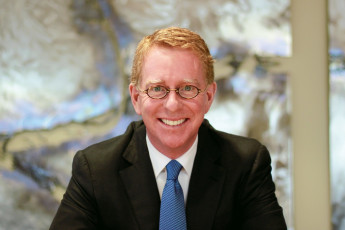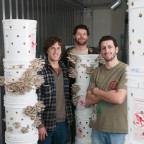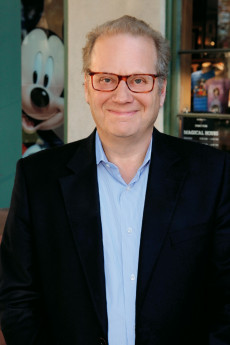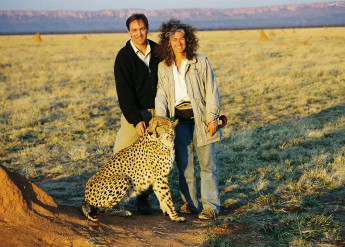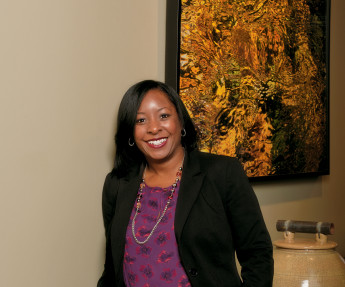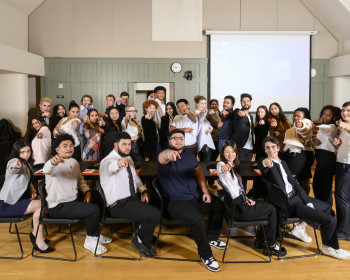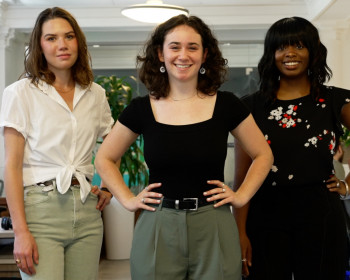Entrepreneurial Alumni
Among the Lewis & Clark alumni ranks are many graduates who have pursued entrepreneurial ventures. The Chronicle caught up with four of them who have forged their own paths in the for-profit and nonprofit worlds. Here they provide a snapshot of their journeys, highlighting the importance of the liberal arts and their enthusiasm about the college’s new Center for Entrepreneurship.
Patrick Mahaffy BA ’85
Major: International Affairs
After graduating from Lewis & Clark, Mahaffy earned a master’s degree in international affairs at Columbia University. The French he took as an undergraduate helped him land a job at a private equity firm, Warburg Pincus. He went on to serve as president and CEO of NeXagen and its successor, NeXstar Pharmaceuticals.
Deciding he was more interested in pursuing his own ventures, he founded and led the Pharmion Corporation until its acquisition by Celgene Corporation in 2008. He is currently president and CEO of Clovis Oncology, a publicly traded biopharmaceutical company based in Boulder, Colorado, which is developing new drugs to fight various types of cancer. He is a trustee of Lewis & Clark College.
Related Stories
A New Start-up on Campus
Entrepreneurial Alumni
Ideas That Mushroom
How did your college education shape your business perspectives?
A liberal arts education is a great place to start —it taught me how to think and how to learn. A great education helps shape individuals who are able to deal with change and adversity as well as new concepts and challenges.
Sometimes there are unexpected benefits, too. I took French and studied in France while at Lewis & Clark. Later, I got an internship at a private equity firm because I could read passable French. I was hired to translate documents, and that’s where I got my start.
I may run a pharmaceutical company, but I recall getting a C in chemistry in college. So the lesson there is that you can also overcome some of the imperfections in your academic background.
What motivated you to transition from investor to entrepreneur?
It became evident to me that I was much more interested in doing things, in being a manager. There was just something about starting and growing an organization that was fascinating to me. I was just 29 [when he became CEO of NeXagen, a biopharmaceutical company], but I quickly became very comfortable with the role of entrepreneur. Temperamentally, I could tolerate risk while understanding how to mitigate that risk. And I was able to make difficult decisions—that’s the key.
When I was a student at Lewis & Clark, I never would have guessed that I’d end up running a pharmaceutical company. But I can tell you that every night when I go to bed, I know that somewhere around the world someone is experiencing a life change because of the work we do, the drugs we’ve developed—and that is a tremendous satisfaction.
As a trustee of the college, you’ve been an active supporter of the Center for Entrepreneurship. Why do you view it as a priority?
Through my role on the board, I saw an opportunity. All institutions, including academic ones, need to evolve. We live in a rapidly changing time when basic business skills are going to help our students not just to compete but to thrive. No matter what their career choices are, students can augment their college education through a grounding in entrepreneurship. The same mindset that has served them so well at Lewis & Clark will help them in their careers—a mindset that finds excitement in exploration.
Do you have any advice for budding entrepreneurs?
You hear a lot about pursuing your passion, and that is definitely true. But sometimes you first need to find your passion, and that can emerge in unexpected ways. You can chart a career path after you graduate, but you should always be ready to seize an opportunity when it appears. Sometimes that might mean taking a job that at first may not sound perfect but could be the beginning of something you never would have imagined. Make your job your passion, and good things will happen.
Dan Cohen BS ’81
Major: Economics
Dan Cohen has built his career around television. He earned a master’s degree in television and radio from San Francisco State University, where he wrote his thesis about professional wrestling. Following stints with several cable television companies and Showtime, he joined the Walt Disney Company in 1997. He currently serves as Disney’s executive vice president for pay television and digital, striking megadeals with companies such as Netflix, Apple, and Amazon.
How has your undergraduate education served you in business?
My degree is in economics, and I learned just enough to realize I didn’t know anything about economics. Still, it was a great foundation for understanding business and the math behind things. But because I was in a liberal arts environment at Lewis & Clark, I was able to take a lot of other classes. I took two terrific television production classes with Stuart Kaplan [professor emeritus of communication]. I also took a lot of history, a lot of lit. I got to play with both sides of my brain and do things that allowed me to be creative and inventive.
At the same time, I’ve realized over the course of my career that my strengths are in strategy and negotiation, so that’s why I’ve gone in the business direction.
Consumer habits in film and television are changing at breakneck speed—how do you keep up?
I’ve been fortunate—I’ve been the digital guy for the likes of Disney, Pixar, Lucasfilm, Marvel, and ABC. This is a growth business, and the models keep changing. As the business has evolved, Disney has let me evolve with it. I get a chance to look around the corner and try new things all the time— I get to be very entrepreneurial even though I work for a massive media company.
To be honest, I don’t feel I know what’s next on the media front. We’re clearly moving in the direction of customers wanting their content on demand, where they want, any time they want, on any device they want. But one thing I always point out that is that over half the country still doesn’t have a DVR. You can’t lose sight of the fact that a lot of people still tune in to Duck Dynasty in real time. While things will keep evolving, I think a lot of traditional stuff is still going to be live, things like sports and special events like the Oscars or Emmys.
What does it take to be a successful innovator in a giant company like Disney?
Doing out-of-the-box things at a big, established company can be challenging. I don’t dream up an idea and execute it on my own. There are layers and layers of management; there are a lot of stakeholders. You have to do a lot of education and consensus building. You have to articulate your point of view and sell it to people who don’t do what you do every day. You also need patience—in the digital world things move fast, but Disney doesn’t move that fast. There’s just a different path from idea to execution.
It definitely takes a certain temperament, but for me it’s not particularly frustrating. I spend more time reflecting on how fortunate I am to be representing Disney’s wonderful content. I don’t have to convince someone The Avengers is a good movie.
Charles Knowles BS ’84
Majors: Physics and Business
Charles Knowles pursued graduate work in engineering and business at Stanford University after graduating from Lewis & Clark. He later founded—and eventually sold—Silicon Valley software company Rubicon Technology.
After effectively “retiring,” he says, he decided to follow his passion for animals. In 2002, Knowles founded the Wildlife Conservation Network, a nonprofit headquartered in San Francisco that supports wildlife conservationists working across the globe. He serves as the organization’s executive director.
What made you decide to leave the high-tech world for animal conservation?
After I retired, I needed to figure out what to do with my life. I’ve always been interested in animals, so after reading a story about someone who had moved to Africa to save cheetahs, I got involved with the Cheetah Conservation Fund.
After that, I saw there was a niche opportunity to support independent social entrepreneurs who were living and working in developing countries saving wildlife. Our network provides these people and groups a framework for their operations. We do the back-office work for them—the fundraising, the marketing. We also assist them with organizational development. We’re now working in 28 countries throughout the world and have deployed $35 million to conservation efforts over the years.
What’s the biggest challenge in getting started as an entrepreneur?
You become an entrepreneur because you see a new way of doing something. But then you have to convince other people, and that can be tough. Surviving that period when you’re building your brand and your reputation can be lonely. It takes a lot of hard work. When we started the Wildlife Conservation Network, we’d go around knocking on doors, having people tell us “no” over and over. Now that we’ve been around 12 years, that part has gotten a lot easier. We sometimes get $100,000 checks from people we’ve never met or spoken to.
What are the differences between working in the for-profit and nonprofit arenas?
Generally, the most fundamental difference is that the for-profit world is completely driven by the head and needs more of the heart. And in general, the nonprofit world is driven by the heart but needs more of the head. Unfortunately, I often see a lack of rigor in terms of strategic thinking and fiscal discipline in nonprofit organizations. And when it comes to corporations, I notice that there frequently isn’t enough consideration given to what sort of contribution they’re making to the world. Both worlds need a balance between the head and the heart.
Also, in the for-profit world, you have a concept or product that generates money that fuels your growth. In the nonprofit world, you’re out there every year with a tin cup to generate money. You have to do that fundraising, and that’s where being able to connect and communicate with people is so important—that’s something you get in a liberal arts education. You also develop writing skills. I spend 90 percent of my time writing—usually emails, but important emails dealing with vital conservation issues half a world away.
What influence did a liberal arts education have on your career journey?
You can never predict the path you will take in your career. My education inspired me by opening me up to a greater worldview. Having that broad-based education is really important whatever you do in your career.
Today, doing wildlife conservation around the world, I use very little physics, but I use a lot of philosophy and psychology.
Paula Hayes BA ’92
Major: Biology
Paula Hayes launched Hue Noir out of her home garage. Seeing that women of color were underserved by the beauty industry, she seized the opportunity—formulating, manufacturing, and distributing her signature line of cosmetics for women with darker skin tones. Her first job after Lewis & Clark was as a research chemist in the food and beverage industry. Hayes combined her research skills and business experience to start Hue Noir, a growing business that will soon be moving to a new manufacturing center in Beaverton, Oregon.
How did Hue Noir get started?
I was doing very well in my career and climbing the ladder, but there was always something inside me that said, “There is more out there.”
Hue Noir was a dream of mine for a long time. I was working on cosmetic formulas way back when I was part of the food and beverage industry. When I’d come home at the end of the day, I’d go to work on my own ideas. But I didn’t officially launch the business until 2009.
My company is all about serving one of the most important markets in the beauty industry—there are approximately 38.5 million women of color in the United States. When you take a look at traditional makeup lines, the choices are few and far between. Unlike other cosmetics companies, we don’t use outside private-label manufacturers with a standard list of formulas and colors. Because I have a product development background, I decided to make our own products to ensure my line has quality ingredients and unique colors.
What’s the toughest part of striking out on your own?
You have to remember to keep the main thing the main thing. At every step of the journey, you’ll encounter people who will see your vision and people who won’t. You need the passion and conviction to stay true to your vision and your path.
How has your experience at Lewis & Clark helped you in business?
Looking back, going to Lewis & Clark was the best thing. When I got to college, I was a very good student and got excellent grades, but I had a hard time with change. From the first day, I knew I wanted to be a biology major, but I also had to pick a broad range of courses. At first, I didn’t see the value, but over time I really started to appreciate the breadth of my education. I took everything from humanities to psychology to dance. I got a sense of adaptability and flexibility, and, in some ways, that set me up for everything since then.
You’ve been a guest speaker at the Center for Entrepreneurship’s Winterim workshop. What do you think of Lewis & Clark’s venture into entrepreneurship?
I wish Lewis & Clark would have had an entrepreneurship program when I was there.
I think I had a bit of an entrepreneurial bug even back then, but I had no idea how to get there.
The sooner you can expose students in a liberal arts setting to some of the ideas behind business and entrepreneurship, the sooner they can start putting together the pieces of the puzzle. If they’re willing to really dive in and put in the hard work, I would encourage students to go for it—whether that’s becoming an integral part of a wonderful business that’s already established or becoming the catalyst for a great new idea in a for-profit or nonprofit. Nothing that’s worth doing comes easy.
More Bates Center for Entrepreneurship and Leadership Stories
The Bates Center for Entrepreneurship and Leadership is located in room 344 of J.R. Howard Hall on the Undergraduate Campus.
MSC: 71
email entrepreneurship@lclark.edu
Chrys Hutchings
Director
chryshutchings@lclark.edu
503-768-7683
Catarina Hunter
Associate Director
chunter@lclark.edu
503-768-8683
The Bates Center for Entrepreneurship and Leadership
Lewis & Clark
615 S. Palatine Hill Road MSC 71
Portland OR 97219
